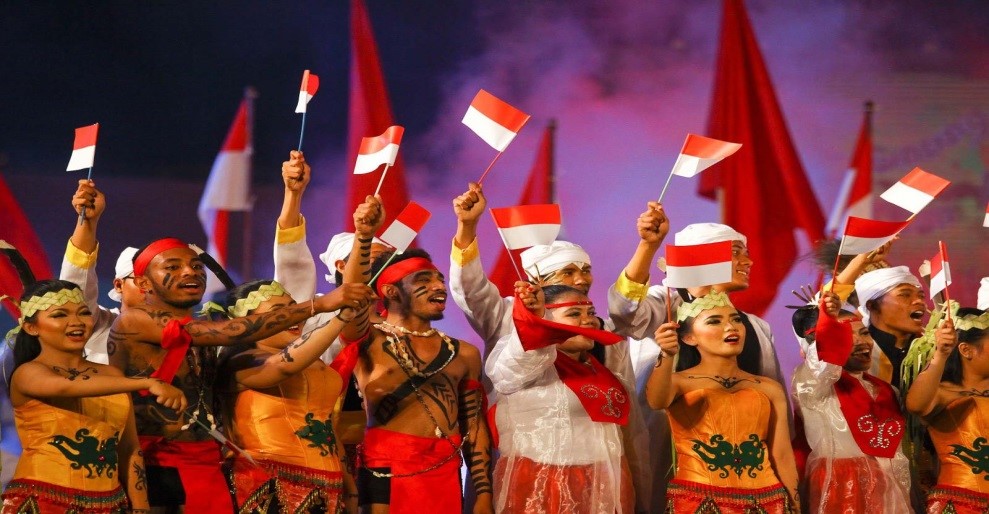I was born in Surabaya in 1950s was lucky to have a good life experience that was about harmonious relations among ethnic groups. In my kampong located in central-north Surabaya the inhabitants are from various ethnic communities, there are Javanese, Chinese and Madurese. In my family’s neighborhood in north Surabaya in the Ampel and Tanjung Perak area even more diverse, there are Javanese, Chinese, Madurese, Arabs, Manadonese, Bugis and Ambonese. In 1950s and 60s I watched life get along well, there was no difference; my cousin (deceased) named Cak Tholib always paired every year with his Chinese neighbor- Om Hendrik in playing badminton in the event of Independence Day, August 17. All tribes in the kampong greet each other kindly. Even when I was a kid when “fighting” with Chinese or Madurese kids we made fun of each other about our origins, but it didn’t become an important issue. The next day get along well again. In the history of the independence revolution of the Surabaya war or “the Battle of Surabaya” all heroes were from different ethnic groups.
Surabaya Chinese people speak “rough” Surabaya local language, Madurese Chinese also speak Madurese, even a professor – my lecturer at Universitas Airlangga Surabaya in the 70s was a Chinese born from Central Java, his Javanese language was very polite. We were also not surprised when the Chinese, who rented my house, had relatives who were members of the KKO-AL or the Naval Command Corps (now marines). I have only witnessed the looting of shops belonging to Chinese descent in the 60s – when Surabaya residents were angry to hear that two KKO-AL members were hanged in Singapore during a confrontation with Malaysia. The riot occurred in Surabaya because it is known that as the second largest city in the country is the headquarters of the Navy and KKO. After that incident I never witnessed conflict because of the ethnic background. It seems that my personal experience is also experienced by people of my age and above who live in the kampongs of Surabaya.
During New Order (Orde Baru or Orba) era president Suharto introduced the word SARA this – stands for Suku-Agama-Ras-Antar Golongan (Tribe, Religion, Race and Inter-Group) and strongly urged people to avoid it. At the end of the Orba era there was a conflict based on ethnicity line in West Kalimantan (where hundreds of thousands of people from certain tribes displaced out of the island), then religious conflicts in Ambon Maluku and Poso Sulawesi; and then there was also a desire for the regional leader to be “Son of the Region” and not “Migrants”.
In other countries we do see the dangerous consequences of this SARA conflict for example before and during World War II, Nazi Germany hated and killed millions of people of Jewish descent. In Rwanda Africa millions of people – including women, the elderly and young children – were killed in the streets, in villages due to ethnicity resentment. In Europe and the United States (until recently) there was a “White Supremacy” movement – a movement that against people of color, then a white man killed the mosque worshippers in New Zealand. The history of western civilization that colonized other countries recorded the killing of millions of indigenous peoples. Even in modern history we witnessed the ethnic killing or “ethnic cleansing” of Serbs against Bosnians based on religious hatred.
My religion teaches us that God almighty accepts us not because of our background, nor our tribe, our position, but because of our good deeds. The history of Prophet Muhammad (peace be upon him) also teaches us that his companions were from different countries such as Bilal who recited the first adhan (call of prayer) was a black gentleman came from Africa – precisely from the area between Egypt and Sudan, and Salman Al Farisi was from Persia etc.
Lately there have been groups of buzzers or influencers who often make opinions that make the nation split. Their narrative is about indigenous vs. non indigenous people, a particular religion against other religion, about which ethnic group contributes the most in the country. Such narratives have a negative impact especially causing the disunity of the nation. Universitas Airlangga as an educational institution should be able to be the glue of national unity.





